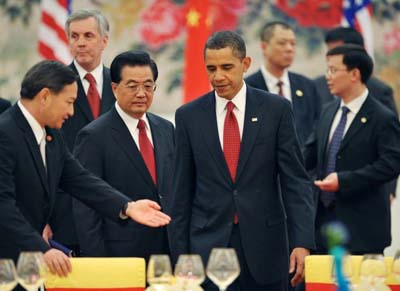
Can Americans Be Trusted to Control Japan?
(Hong Kong) on 30 September 2010
by (link to original)
Can the idea of collaborating with the United States to go against Japan work? The answer is obvious. It is too immature for the United States to exert pressure on Japan just to protect the interests of China, and it is a greater mistake to think that the United States will collaborate to control Japan.
Indeed, the United States has the capacity to exert pressure on Japan – the key lies in the willingness to do so, how to do so, and for whom. For a long time, Japan has acted like the United States of Asia. To maintain its position in Asia, Japan has been allies with the United States. This is especially so considering Japan’s present political instability (which has seen five phase changes in more than three years); its inability to recover from the economic recession; its great amounts of debt; the appreciation of the yen and the threat that China will take over its position as the world’s second most powerful economy. Hence, Japan would want to employ help from the United States to deal with China. Even if the United States makes a small move, Japan will willingly follow suit.
However, the United States will not help China but will instead be happy to see tension in the Sino-Japanese relationship. As long as Japan feels threatened by China’s presence, it will seek cover from and work with the United States. Then it makes it even more reasonable for the United States to station some of its military troops in Japan.
Looking at the entire Diaoyu Islands incident, we find that the United States is ubiquitous. This year, the United States has used the Tianan ship incident to announce its return to the Asian Pacific region, strengthening its military ties with South Korea and having joint military exercises with them, showing off its military powers in peripheral areas of China. Japan dared to challenge China only because it was encouraged by the United States’ actions. After the boat incident, the United States has not been clear in addressing sovereignty issues of Diaoyu Islands. On the other hand, they have clearly announced that the Diaoyu Islands is a region collaboratively protected by Japan and the United States. Using the Japan and United States Security Act, Hillary Clinton, Robert Gates and other renowned figures have taken turns to declare that the United States supports Japan on political and military terms.
By thinking they had nothing to fear, Japan adopted a tough strategy in handling the Diaoyu Islands incident, misjudging the situation and causing the conflict to escalate. In this incident, the United States played the role of the arsonist, definitely not of the firefighter.
Since China and the United States would benefit if they cooperate and would suffer if they fought, these two superpowers can only cooperate in order for them to be successful. The relationship between the two countries has been affected by the United States’ arms trading with Taiwan, which did not benefit either country and was not as important as solving greater international and regional problems. As a result, both countries resumed relations, not because they wanted to be on par with Japan, but because the relationship China has with Japan and the one it has with the United States concern different levels of significance.
To deal with the conflict between Japan and China, both countries have to work together. It is an undeniable fact that, as neighboring countries, Japan and China have to help each other. It is common knowledge that a conflict between these two countries will only be against the interests of their citizens. Both countries will first have to prevent extreme nationalist ideas from spreading, so as to build a foundation of trust among its people. This is the bigger picture, and it sets both countries in the correct direction.

